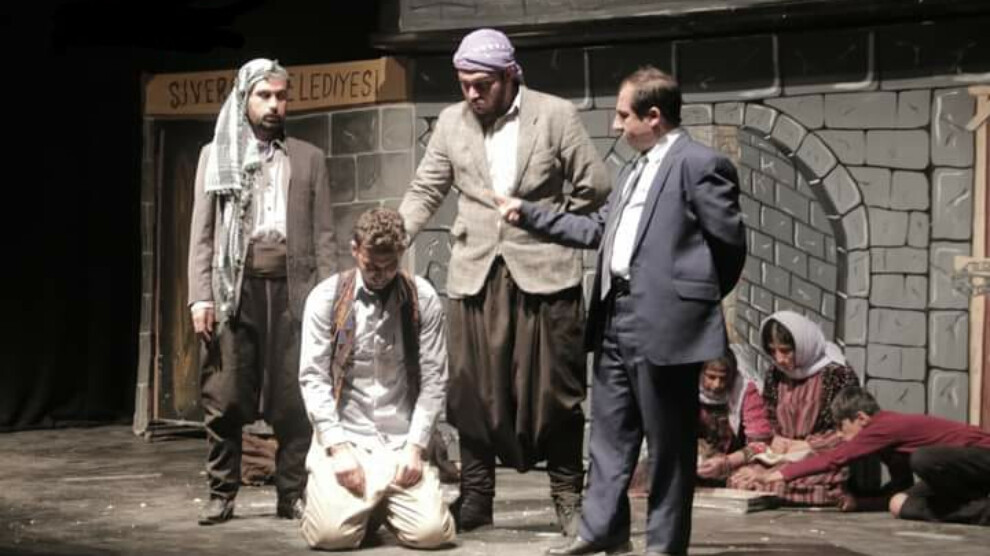A theater project in Rojava; ‘2 workshops, 2 plays’
Thanks to the publicity made in the cities of Qamişlo and Dêrik, around 50 people attended the workshops that produced two new plays.
Thanks to the publicity made in the cities of Qamişlo and Dêrik, around 50 people attended the workshops that produced two new plays.

Art, especially the art of theater, has a very important place in the mindset of society. Even more important for a society in the grip of genocide. Theater, one of the most influential branches of art in the revolutionary art struggle against the genocide, plays a dominant role in the field of art in freely reconstructing the mentality of society.
The Rojava Theater Committee successfully implemented the project called 'Two Workshops, Two Plays' together with Şanoya Çiya, which continues to work under Tev-Çand. The project, which wants to contribute to the formation and construction of social mentality in the field of art, through theater, is an important step in the Kurdish language.
Aiming education, organization and artistic practice, Rojava theater actors realized their projects step by step, despite all the difficulties, under very heavy conditions. Based on their own strength and the efforts of the Rojava youth, the theater actors staged the theatrical works they prepared for the 45th anniversary of the PKK. In this way, they produced 2 successful plays on the history of the party. With this project, young people were educated, organized and put into action.
The actors from Rojava played their works freely and with great courage, under the noise of the drums of war. They did not just play, they managed to roll up their sleeves to recreate life, to produce, to protect productions and to meet their values.
Two Workshops
Thanks to the publicity made in the cities of Qamişlo and Dêrik, around 50 people attended the workshops, which started by giving acting, scenario and camera lessons to the young people who came together for the first time in their lives and stepped into the arts. After a month of training, the young people rolled up their sleeves and started preparing for 2 plays for the 45th Anniversary of the PKK. In both plays written by Şanoya Çiya, they present sections from the history of the PKK to the public.
Two Plays
Two separate plays, written by Şanoya Çiya, were brought to the stage by the students of the theater workshop of Qamishlo and Dêrik after great effort.
The two plays are called Rastî Dagirkirî and Dara Jiyan'ê.
Rastî Dagirkirî tells the story of the Siverek resistance before 1980, under the leadership of Salih Kendal, one of the first cadres of the PKK, which left its mark on the history of the PKK.
Salih Kendal, a primary school teacher, joined the PKK while teaching in Ağrı. The play was created years ago. It was written and staged by Hêvî Sanoger. This time, the play performed by Rojava artist and director Kawa Fettah was much appreciated by the audience.
The second play, Dara Jiyanê's story, is old, but the script was written recently. The play, written by Şanoya Çiya in 2017, again tells about the founding days of the PKK in 1978, the first congress. Dara Jiyanê is a play that integrates the poem Dara Pîr by poet Cemal Melikşa from Rojhilat and the process witnessed by the house where the PKK was founded, the house of the Zoğurlu family.
The play, which is woven around the axis of dialectical principles such as good-evil, yesterday-today, local-universal, takes place in the garden of the Zoğurlu family. The play tells the resistance of Seyfettin Zoğurlu's mother against the village headman's request to cut the tree in the garden of the house where the PKK was established. It is about the Apoists choosing the house for the meeting and the process of coming home. The family got to know Mazlum Doğan, Sara, Abbas and Cuma, and secretly opened the house to the Apoists. They met Leader Apo, loved the PKK cadres, and at the same time protected the tree in the garden.
Directed by Şanoya Çiya, the play both moved the audience and took the audience back to the early years, showing how alive the past is still.
Both plays, shot by Komina Filma Rojava and Nefel Produksiyon, will soon be available for the public to watch on digital media.
The plays, which were supposed to go on stage on 27 November, were postponed for one week due to the Turkish attacks and to pay tribute to the martyrs who fell in those air attacks. Both plays will continue to be screened in many places, especially in Qamişlo, Dêrik and Rimêlan, in the coming days.